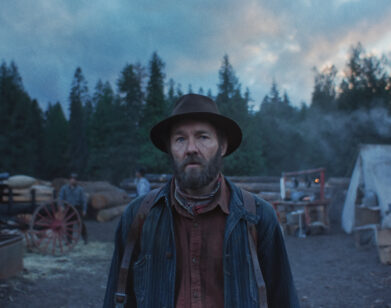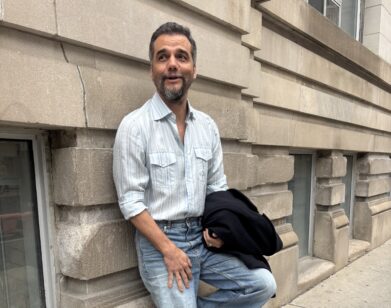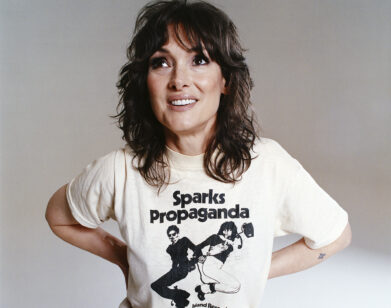ICON
Marianne Jean-Baptiste on Hard Truths and Industry Politics

Marianne Jean-Baptiste, photographed by Sasha Frolova.
Marianne Jean-Baptiste has been delivering masterful performances for decades, but Hard Truths might be her career pinnacle. She first worked with director Mike Leigh in the 1996 drama Secrets & Lies, and in his latest film, she plays Pansy, a British woman so wound up with fear, anger, and exhaustion that some audience members have found her unbearable—which, as Jean-Baptiste sees it, is part of the point. The film follows Pansy as she navigates a life of simmering resentment, strained family ties, and self-imposed isolation, and the role earned her accolades, including wins for Best Actress from the New York and L.A. Film Critics, and a nomination at this weekend’s BAFTAs. And yet, when Oscar nominations were announced last month, Jean-Baptiste’s name was glaringly absent. But as she told us earlier this month, while the snub stung, it did nothing to diminish the power of the work.
———
BEN BARNA: Hi, Marianne. How’s it going?
MARIANNE JEAN-BAPTISTE: Not too bad. A bit of a rainy, gloomy day here.
BARNA: In L.A.?
JEAN-BAPTISTE: Yes.
BARNA: How’s everything going over there?
JEAN-BAPTISTE: It’s weird. You know that there’s all this stuff happening around you, but we’re not directly affected by it.
BARNA: Because it’s such a sprawling place.
JEAN-BAPTISTE: Yeah. That’s the thing.
BARNA: Well, a slightly awkward transition to the film, but I saw it at Lincoln Center a while ago, and since then I talked to other people that have seen it, and some of them told me that they just couldn’t take it, because Pansy is such a difficult person to spend two hours with. One friend told me that he had to leave. Has anyone said that to you? And when you hear that, does it feel like job well done?
JEAN-BAPTISTE: I think I’ve heard it, but people have generally stuck with it. But that kind of is the point. We encounter people like that all the time in life, and our instant reaction is to get away from them. I think the film begs you to look deeper, and maybe reflect on the parts of that character that triggered you. What is it about that person that triggers you, and is it something that you recognize in yourself or somebody that you know?
BARNA: Were there parts of her that you recognized in yourself?
JEAN-BAPTISTE: There are parts of her observations, the way that she views the world. I’m very observant, but I come from a place of curiosity, humor, and I’d like to say compassion, whereas hers is purely judgmental and things are irritants, do you know what I mean?
BARNA: Do you know people like her?
JEAN-BAPTISTE: Yeah. I’ve brushed up against Pansys in shops or in a car park. They’re all around us. Whether you call them Karens or whatever you want to label someone like that, you always encounter people where you think, “My god, something must be going on, because I’ve not done anything to you.”
BARNA: Do you think that she’s in control of her anger, or does her anger control her?
JEAN-BAPTISTE: I think it controls her. It’s quite clear that she’s somebody who is afraid. I speak about it being like a dog that barks and barks, and when you observe the dog, you realize that the tail is down, so they’re actually afraid. They’re not doing it because they’re going to attack you, necessarily. It comes from fear.
BARNA: Do you think fear is the great underlying symptom of what causes her to be the way she is in the world?
JEAN-BAPTISTE: We can’t simplify it and say, “Oh, it’s fear.” It’s a cocktail of a life of disappointment and pain, and all the other stuff that makes people angry or fearful or just not at ease in the world.
BARNA: That’s right. There’s a scene in the film where her sister asks her why she can’t enjoy life, and she says, “I don’t know.” Do you think enjoying life is a mindset, or do personal circumstances get in the way?
JEAN-BAPTISTE: I think it’s a mindset. Yes, it is a product of your experiences, et cetera, but in the case of Pansy, she has always felt different. She’s not felt part of her family. The way in which we create the characters, it’s set up that way. Her sister Chantelle had more of a relationship where she and her mother laughed a lot. They shared the same sense of humor, the same interests, and Pansy always felt like the odd one out. She has a whole thing about not being able to enjoy. Part of her childhood was looking after her younger sister, even though she didn’t like going outside to play or what have you. It was like she didn’t learn to develop the enjoyment of being with others as she was growing up.
BARNA: When did you shoot this film?
JEAN-BAPTISTE: 2023.
BARNA: It’s now 2025 and you’re still talking about this character. What is that like?
JEAN-BAPTISTE: I don’t know if you know about the way that Mike [Leigh] works. You’re so invested in it. He regards actors as creative artists in their own right, not just interpreters. You’ve created this character with him. You’ve created the dialogue. It’s such a collaborative experience and a unique experience that, actually, talking about it is a joy. It’s not like talking about a lot of projects that I’ve done. [Laughs]
BARNA: Has anyone approached you in the street about this role?
JEAN-BAPTISTE: I haven’t been recognized for Pansy, but obviously after screenings and Q&As, people come up and say, “That’s my mother-in-law,” “That’s my auntie,” “That’s my grandmother.” Some men have professed to being Pansys.
BARNA: The movie offers very little in the way of catharsis or resolution. Why do you think that Mike chose to withhold that?
JEAN-BAPTISTE: I think it’s life.
BARNA: Yeah.
JEAN-BAPTISTE: I think we’ve become very lazy viewers, or very lazy storytellers, in that you’d watch a film and 10 minutes into a murder mystery or whatever, you’re like, “Oh god, it’s him. He’s the one that did it.” If this was a regular movie, Pansy, after the Mother’s Day lunch, would have transformed into this loving, pleasant, mild character. When in life does that ever happen? This movie is for adults.
BARNA: Yes, it is.
JEAN-BAPTISTE: It’s for thinking people, and for people that can go, “Okay, I’m going to go and finish this film off in my head, or argue about it with my friends. I think she goes downstairs.” And other people go, “No, I don’t think she does. I think this is the breaking point and that she’s going to look after herself.” It’s about handing the movie over to the audience.
BEN BARNA: Those are always the most memorable endings, the ambiguous ones. But audiences are trained to expect some resolution to their stories.
JEAN-BAPTISTE: Right.

BARNA: One of the more memorable scenes of the movie is when Pansy chews out the shopgirl. It’s uncomfortable to watch, but as an actor, do you relish a scene like that when you just lay into this poor girl?
JEAN-BAPTISTE: You don’t get to relish it as much, because you’re so steeped in her anxiety, fear, and anger that you’re just being her at that point. Obviously, my experiences of going into shops and dealing with people that look really unhappy to be there will inform what Marianne thinks Pansy would do in that situation. I mean, it’s exhausting to be like that the whole time. Do you know what I mean? You don’t get a chance to really enjoy it, because it’s just going, “Okay, this is irritating, this is painful. I just want to get out of here.” Those are her thought patterns that are going on the whole time.
BARNA: Did you have a recovery process in terms of spending a day inhabiting her?
JEAN-BAPTISTE: I mean, it’s in stages, because we have a very disciplined method when working with Mike about getting in and out of character. The rehearsal period was three months, so you’re steeped in that world, but it’s by no means method acting. If it were method, Mike probably wouldn’t have gotten a film done because Pansy would have been arguing with him the whole time. I would literally just go back to the apartment and do the things that I like doing that Pansy doesn’t. Enjoying cooking, enjoying tidying up, reading something, having a glass of wine, and that would be grounding in and of itself.
BARNA: Do you see her struggles as part of any larger societal issues? Is Hard Truths a movie that wants to say something about the world or is it purely a character study?
JEAN-BAPTISTE: Well, if you study a character, I think that the world has got to be reflected in that. Because people live within, communities and countries and worlds. And people like her have always existed. If Pansy were younger, she’d probably be diagnosed with something.
BARNA: That’s right.
JEAN-BAPTISTE: But because she’s a 57-year-old woman, whatever behavior was manifesting itself when she was younger, people just said, “Get on with it.” They fidn’t take her to the doctors to get it checked out. I think it is speaking to some of the characters that we see that we completely write off as just being unbearable or awful, and that maybe we shouldn’t. Maybe we should have a bit more compassion and check into what’s going on. I mean, she’s depressed. On a basic level, it’s depression.
BARNA: This performance of yours has been universally praised. You’ve won awards from the New York Film Critics Circle, the Los Angeles Film Critics Association, and so on. I wouldn’t be doing my job if I didn’t ask you about the Oscar nominations. I thought you were going to get nominated, and so did a lot of people. How did you feel when you weren’t nominated?
JEAN-BAPTISTE: It was very disappointing. It was very disappointing.
BARNA: I appreciate the honesty.
JEAN-BAPTISTE: Yeah, yeah. What am I supposed to say? I’ve got feelings, man. Pansy would’ve burned down the Academy building [Laughs].
BARNA: Go on.
JEAN-BAPTISTE: Look, I’ve got to be completely true to what I believe as an artist, and it really is about the work.
BARNA: Of course.
JEAN-BAPTISTE: I think this film’s going to live. I really do. It’s going to go down as a really important film in terms of a character study, in terms of a Black female lead in a film like this with no stereotypes or tropes, no police brutality—there’s no racism in this film whatsoever. We are typically placed in films where how we’re treated in society is why we’re even in the film in the first place, so this was really refreshing, to see a woman allowed to be badly behaved. All in all, I feel like I won, baby.
BARNA: Exactly. Awards are great for bringing attention to films that might not be seen otherwise, but there is something bizarre about turning art into a competition where essentially, the money being spent for campaigns is as if not more important than the work itself.,
JEAN-BAPTISTE: Well, art is not industry. I think the sad thing about this is that there is this element of competition at the end. It somewhat feels like The Hunger Games.
BARNA: Yes.
JEAN-BAPTISTE: I don’t know if you’re familiar with The Hunger Games.
BARNA: Sure.
JEAN-BAPTISTE: People getting gifts like that. If you’ve got enough people giving you gifts, i.e. a huge streamer, then you are more likely to survive. If you are a small little independent thing, it’s like fuckin’ David versus Goliath, you know what I mean? I thank god for the critics, because I really believe that without their support for the film from the very beginning, it would’ve just disappeared. That wouldn’t have changed anything about the film, or the performances, but it just wouldn’t have been seen, because it didn’t have the money going with it. Then what are we saying about our industry? Only if you’ve got a lot of money, can you survive out here on these streets? Do you know what I mean? That saddens me. You go to these festivals, and I obviously didn’t have time to see anything, but you see hundreds of films that never see the light of day.
BARNA: I know.
JEAN-BAPTISTE: It’s because of money. It’s because we haven’t got a distributor that’s got millions or billions.
BARNA: Yeah, no. You hear about Netflix pouring tens of millions of dollars into their Oscar campaign, and you’re like, “What is driving this, then? Is it the money or is it the work?”
JEAN-BAPTISTE: Yeah, that’s it. That’s my thing. You go, “What’s driving this machine, man?”
BARNA: In your case, it is definitely the work.
JEAN-BAPTISTE: Oh, very much so.






